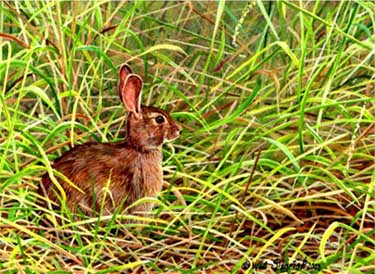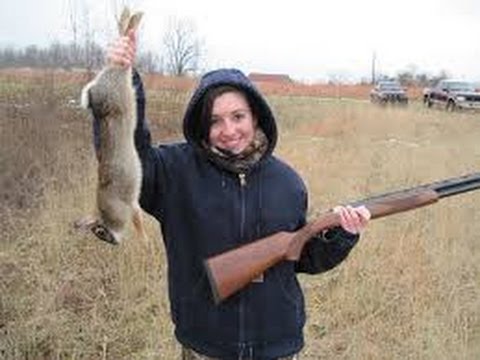
Contents
- 1 How to Hunt Rabbits
- 1.1 What Type of Rabbits Can You Hunt?
- 1.2 How to Find Rabbits
- 1.3 When is the Best Time to Hunt Rabbits?
- 1.4 Rabbit Hunting Without Dogs
- 1.5 Rabbit Hunting With Dogs
- 1.6 Tips for Shooting Rabbits
- 1.7 Guns, Chokes, and Loads for Rabbit Hunting
- 1.8 What to Wear When Rabbit Hunting
- 1.9 How to Clean a Rabbit
- 1.10 Avoid Tularemia
- 1.11 How to Cook a Rabbit
- 1.12 Book a Hunt or Buy a Pup
- 1.13 Final Thoughts on How to Hunt Rabbits
How to Hunt Rabbits
Rabbit hunting was once king, but its popularity declined as deer and turkey populations rebounded. However, there is now a rabbit hunting revival, particularly in the southeast. If you’re considering giving rabbit hunting a try, here’s everything you need to know. We’ll cover the following topics:
- What Type of Rabbits Can You Hunt?
- Habitat: How to Find Rabbits
- When is the Best Time to Hunt Rabbits?
- Rabbit Hunting Without Dogs
- Rabbit Hunting With Dogs
- Tips for Shooting Rabbits
- Best Guns, Chokes, and Loads for Rabbit Hunting
- What to Wear When Rabbit Hunting
- How to Clean a Rabbit
- How to Cook a Rabbit
What Type of Rabbits Can You Hunt?
The Eastern cottontail and the swamp rabbit are the most commonly hunted rabbit subspecies. The Eastern cottontail is found throughout the eastern U.S., while the swamp rabbit inhabits lands across the Gulf Coast and south-central portions of the U.S. Jackrabbits are often targeted out West due to their destructive nature.
Common Cottontail Rabbit Subspecies
- Eastern Cottontail (Sylvilagus floridanus)
- Swamp Rabbit (Sylvilagus aquaticus)
- Desert Cottontail (Sylvilagus audubonii)
- Mountain Cottontail (Sylvilagus nuttallii)
- Alleghany Cottontail (Sylvilagus obscurus)
- Marsh Rabbit (Sylvilagus palustris)
- New England Cottontail (Sylvilagus transitionalis)
How to Find Rabbits
Rabbit populations vary by region and depend on predator numbers and available habitat. Look for rabbits along field edges, in timber, and in heavy cover. They also love wood piles and places to hide. Good spots to find rabbits include hollow logs, briar thickets, overgrown fence rows, brush piles, abandoned barnyards, home sites, junk piles, and old vehicles left out in the field.
When is the Best Time to Hunt Rabbits?
Rabbit hunting seasons typically take place from mid-November to the end of February. The best days to hunt are when the temperature is around 45-55 degrees and the sun is shining. Rabbits tend to be most active at dawn and dusk. The early season and the late season are both productive for different reasons.
Rabbit Hunting Without Dogs
Rabbit hunting can be done with or without dogs. When hunting without dogs, one hunter can act as the shooter while the other beats brush to push rabbits out of cover. You can also slowly move through target areas, stopping every 15 to 20 paces to scan the landscape.
Rabbit Hunting With Dogs
Beagle hounds are the top choice among rabbit hunters. They are small and skilled at sniffing out rabbits. Once the chase begins, quickly move to the location where the rabbit was first jumped. Be ready for the rabbit to circle back to its hiding spot.
Top Rabbit Hunting Dog Breeds:
- Beagle
- Basset Hound
- Dachshund
- Jack Russell Terrier
- Feist
- German Wirehair

Tips for Shooting Rabbits
Rabbit hunting offers challenging shot opportunities. To increase your success rate, take a stand in a location with ample openings. Lead the rabbit when shooting and be still and quiet to avoid spooking approaching rabbits. Whistling like a hawk can make a rabbit stop, giving you a better shot.
Guns, Chokes, and Loads for Rabbit Hunting
Most hunters use a 12 or 20 gauge shotgun with a modified choke and a 26 or 28-inch barrel. The best loads for rabbits are 7 ½ shot for cottontail rabbits and 4 or 6 shot for larger swamp rabbits. Any shotgun and choke combination will work as long as you can smoothly swing on a fast-moving target.
What to Wear When Rabbit Hunting
Wear comfortable, layered clothing suitable for the conditions. Quality boots are a must, with the style depending on the terrain. Briar-proof pants or bibs are essential for navigating through brush and briars. Complete your outfit with an orange vest and hat for visibility to other hunters.
How to Clean a Rabbit
Follow these steps provided by the Missouri Department of Conservation to properly clean a rabbit:
- Cut through the skin around each hind leg above the “knee” joint.
- Cut through the skin from one hind foot to the other, staying on the inside of the legs.
- Separate the skin from the carcass halfway down the rabbit’s back.
- Pull the skin downward from the belly side of the rabbit.
- Remove the skin all the way down to the rabbit’s front legs.
- Separate the skin from the rabbit’s leg at the “elbow” joint.
- Remove the front legs and continue pulling the skin downward.
- Separate the rabbit’s head from the rest of the carcass.
- Gut the rabbit by making an incision below the sternum and cutting downward through the pelvis.
- Remove the entrails by grabbing above the heart and pulling downward.
- Rinse the carcass thoroughly.
Avoid Tularemia
Tularemia is a rare infectious disease that can be spread from infected rabbits to humans. Always wear gloves when cleaning rabbits and cook rabbit meat to 160 degrees to prevent infection.
How to Cook a Rabbit
Fry rabbit quarters in flour, salt, and pepper after brining them in buttermilk. Heat oil in a cast iron skillet to medium-high heat and fry the rabbit until golden brown. Make sure the internal temperature reaches 160 degrees.
Book a Hunt or Buy a Pup
If you’re interested in booking a rabbit hunting adventure or buying a Beagle pup, check out Montague’s Beagle Chase Hunting Service on Facebook or call (901) 626-5822.
Final Thoughts on How to Hunt Rabbits
Rabbit hunting provides a unique experience steeped in tradition. It’s a casual hunt best enjoyed with friends and family. Despite the small size of the game, the memories made will be mighty.

A skilled hunter, dedicated conservationist, and advocate for ethical practices. Respected in the hunting community, he balances human activity with environmental preservation.
